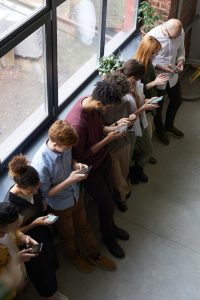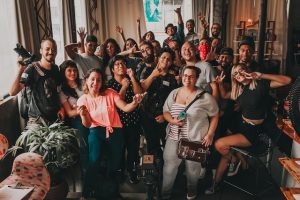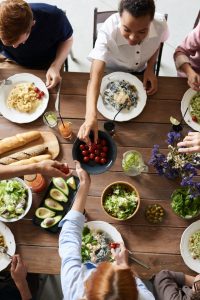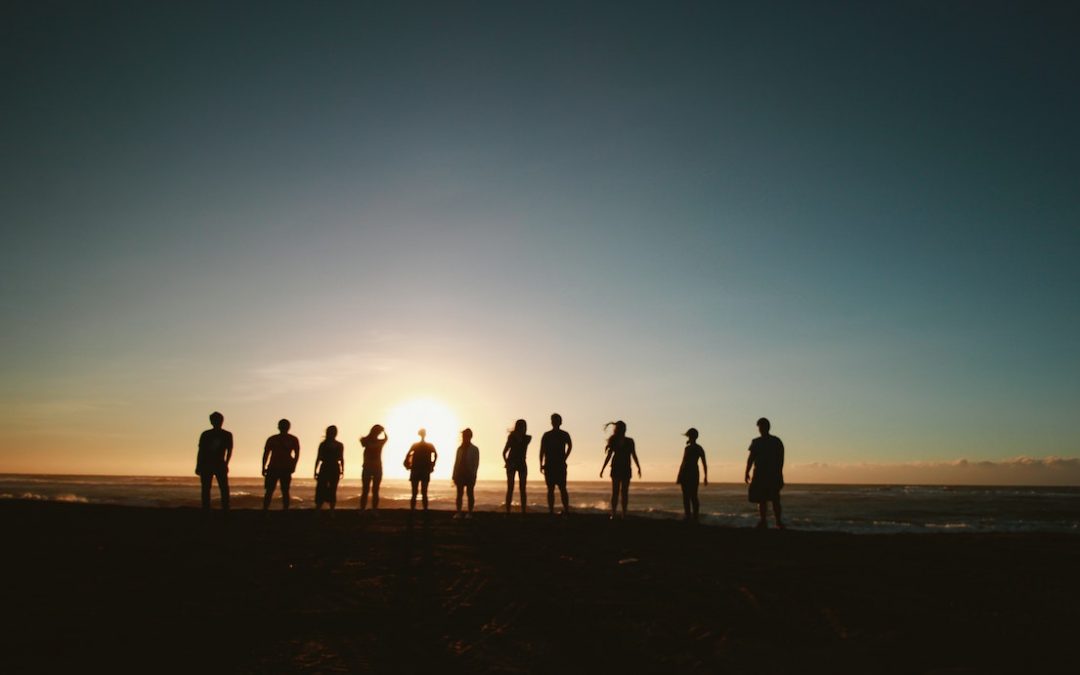Written by: Jena, The Wellness Resolution 100% (NO Ai was used)
Why are communities important?
An essential key to our happiness and health is in having community. It is said that people die sooner or are more susceptible to health issues due to loneliness. We all need genuine relationships and a sense of community. It doesn’t matter what type of relationships, whether its friends or family. And the quantity doesn’t really matter. The goal is to have enough close, healthy relationships based on your needs. Being accepted into a group gives us a stronger sense of self and can help us cope with negative experiences and feelings (Marques, Dee). We need community to improve our self esteem, help us follow our dreams, and provide value. These are relationships where there is mutual respect, people you can rely on, people that will be there for you during a crisis, etc.
In the blog, I will talk about why loneliness is a disaster for our health, why society struggles today with making genuine connections, and how to find community and friendships.
I won’t talk too much about what healthy relationships are because it is covered in my blog How Relationships Influence Our Health (in multiple ways) & Our Success. I talk about how to evaluate your relationships, what it means to be in a positive relationship, why it is beneficial to have a variety of relationships, the importance of boundaries, and understanding toxic relationships.
Why are Communities Important? Well, Loneliness is a Disaster for Our Health
After a study was done on loneliness, the New York Times stated our country is experiencing a “loneliness epidemic.”

Half of U.S. adults report experiencing measurable levels of loneliness.
The study also showed:
Loneliness and weak social connections are associated with a reduced lifespan similar to someone smoking fifteen cigarettes a day and are associated with having a greater risk of reduced lifespan than someone with obesity (Jauwena, 2019). It is also linked with a greater risk of heart disease, dementia, anxiety and depression (Jauwena, 2019).” Loneliness also has been shown to affect work place performance, creativity, decision-making and reasoning.
Loneliness Has Become More Common
United States Surgeon General Dr. Vivek Murthy wrote a Surgeon General Advisory sharing concerning evidence of a health crisis of loneliness, isolation, and lack of connection in the U.S. Even before the onset of the COVID-19 pandemic, approximately half of U.S. adults reported experiencing measurable levels of loneliness (US Department of Health). This affects all aspects of our health.
Anxiety and depression cases skyrocketed during the p*ndemic. There were even more cases of suicide due to the loneliness. Many people didn’t get to say goodbye to their dying relatives and some people died alone. I think we can all agree, there was a lot of harm done.
With the p*ndemic more people ended up struggling with this feeling of loneliness. However, not only due to all the restrictions that were placed upon people, but also because of the conflicts the p*ndemic created.
When Fear Leads to Loneliness
 When the p*ndemic happened people in charge wanted us to be divided. They wanted us to have more conflict.
When the p*ndemic happened people in charge wanted us to be divided. They wanted us to have more conflict.
Many people chose not to be over concerned with isolating themselves because they knew the importance of community. I have read God designed us to need human connection. My current church and past church are always talking about community. Being apart of a community is part of both their mission statements, continuously emphasized, and many opportunities are presented to develop community outside of regular church services.
Many people chose to have more faith than fear. Which isn’t a bad choice because actually being anxious can harm your immune system, therefore increasing the likelihood of getting sick. Not having enough exposure to germs can also harm the immune system (not leaving the house and being in isolation). Of course, everyone has to do what is right for them. We all have different health needs.
I appreciate those who didn’t attacks others for their decisions on social distancing, masks, v*c*nnes, and other guidelines.They just chose to be respectful of other people’s choices.
I didn’t understand at first why some people were making certain decisions, but my thoughts were not to attack their choices. My thought process was to ask questions. Some people explained their concerns and it made sense. But even for those I didn’t agree with, it is not my choice. Why would I angrily attack them? That is what freedom is all about, being able to decide for ourselves.
Society Struggles with Genuine Connections
More ways to Communicate, Yet Less Authentic Communication
 Although we have more ways to communicate today with texts, emails, social media, virtual calls, and of course phone calls and mail. I believe we have lost something. We have lost the ability to really authentically connect with others.
Although we have more ways to communicate today with texts, emails, social media, virtual calls, and of course phone calls and mail. I believe we have lost something. We have lost the ability to really authentically connect with others.
I have met many people in my generation that are now afraid to call someone for fear it may be awkward, intrusive, or may take too much of their time. To say I never feel that way myself would be an outright lie. But I wish I didn’t feel that way.
I actually didn’t want to text when it became popular and everyone around me was texting. I was not about it. But slowly over time I adapted. I adapted because I had to. There are times I love having the ability to text, but there are also times I hate it. Sometimes it gets ridiculous due to: taking forever to make plans, having long-winded conversations over text, having miscommunications that would not have happened with a phone call, etc. I try to call people sometimes and not just text, but often texting feels more natural. Of course, I call when it is important, and I never hesitate to call my closest family members.
Are You Actually Too Busy?
A bigger problem is that with the ability to see what is happening with friends/family by following them on social media or checking in via text, people don’t take the time to call to see how someone is doing. Some will say they are too busy. However, we are often busy because we choose to be. There could be time to call someone while driving in the car, while taking a walk to get some exercise, while cooking a meal, or time spent talking vs scrolling social media and posting updates. Time can often be created. It is just about having the desire to do so.
Are you scrolling through social media out of boredom, to just get a quick update of what is happening, or are you scrolling because you want to feel connected to people? I have scrolled social media just because I’ve wanted to feel connected to people, it is not why I post stuff, but it has been why I’ve spent time scrolling. I don’t feel scrolling social media has really helped with that feeling of connection, it is artificial at best.
Our culture values the concept of being busy! Saying your busy is almost like a prideful thing for some. Some people will say, “But I am actually busy.” But are you? Often people are busy because they chose to be. I’m not a fan of the word “busy.” I think it gets overused. It makes sense to use the word when your swamped with work, or obligations that you have no control over. I think fun plans you make isn’t being busy. It is just having a lot planned. I have caught myself saying “busy” a few times regrettably. When actually my plans were more of a choice than a bunch of stuff happening that I had no control over.
Why Not Call?
Anyway, what is wrong with calling? I don’t understand why some people are confused by a person calling them. Texting is fun and useful at times, but if you want to have a real conversation it has to be done audibly. I’ve had people get mad at me for not responding soon enough to a text, and my answer was “then call me if it is that important.” I’m not going to let texts interrupt my life, my routine, my work, or a fun activity I’m involved in.
It is possible for me to go several days without texting. I don’t want to be addicted to my phone. Because of that I wrote a blog with ideas to help me and others: Addicted to Your Phone? Ideas for Spending Less Time on Your Phone.
How Do We Develop Community?
 Community is all about bringing like-minded people together with similar interests. I think being apart of one or more communities is a beneficial thing for everyone to have.
Community is all about bringing like-minded people together with similar interests. I think being apart of one or more communities is a beneficial thing for everyone to have.
Luckily, there are so many ways to develop or get involved in a community today. We have so many apps, websites, and other resources where people can find their community.
It is easy to find people with similar interests or backgrounds through Facebook groups, Meetup, LinkedIn, and other platforms. You can meet with people with similar hobbies, people in the same type of business, people who have been through similar struggles, and so on. People can also find a community within a church, build up community with their neighbors, join an organization, become part of a networking group, or build community through volunteer work. There are many ways to find community.
I actually tried to start a community through my business earlier this year. So I had the opportunity to read a lot about what it means to build community and how to do it the right way. It is called “THE ART OF GATHERING: HOW WE MEET AND WHY IT MATTERS.” I highly recommend this book for anyone who is the organizer of a community, or organizes a lot of events.
Even if you suffer from depression, anxiety, chronic illness, or other challenging health issues, it is still possible to find people who can relate. They are online support groups, social groups for people who share similar struggles, and health coaches to help.
Put Yourself Out There
I keep hearing people say it is harder to make friends the older we get. I was going to say it should be easier… we should be more confident in who we are, have better communication skills, and even have more practice being a good friend. However, after talking to a friend about it, I think it depends on where you live. Small towns are not great for trying to meet new people. Also, if you live in a place with very few activities or meetups, it is going to be harder!
I definitely agree it is super hard when you have literally no friends and you are living in a new place. It is tempting to just make friends with anyone. However, the more good friends you make, the easier it gets.
My Experiences
 My husband and I had to start from ground zero making friends as we moved into a new state. It was intimidating at first because we knew no one. So I had us going to Meetups to meet new people.
My husband and I had to start from ground zero making friends as we moved into a new state. It was intimidating at first because we knew no one. So I had us going to Meetups to meet new people.
If I felt like I had a lot in common with someone, I asked to exchange numbers to meet up outside of the group. It is kind of a numbers game! You might have to make an effort to meet up with a lot of people before you find your people. If you don’t ask, it is going to take you way longer.
I’ve been ghosted, and some we mutually decided not to connect again, which is fine. I would rather have friends I have plenty in common with then just any random person.
There is also online Facebook groups to meet people which I have done, and it has worked great. Again, a numbers game. Some of the chats never lead to a meet up in person, and some coffee was where it ended. If you are an introvert, start online and don’t be afraid to ask to meet up. Most people won’t say no. They will just ghost you and then you move on. It doesn’t have to be complicated. Many people also use the Bumble App to make friends. That way you can share a profile of who you are.
View All Wellness Lifestyle Blog Posts:
- How Relationships Influence Our Health (in multiple ways) & Our Success
- We Devalue Empathy, Yet We All Need It!
- Effectively Communicating for Stronger Relationships
- How an Unhealthy Spine Can Cause Numerous Problems
- Managing 3 Stages of Stress (Conscious, Hidden Stress & Preventing It)
- Cardio vs HIIT – Find out the Benefits of Both!
- How Exercise Can Be Natural & Fun
- Nature Heals the Soul, Calms the Mind & Restores the Body
- Everything You Need to Know About Supplements
- How to Sleep Better & What to do When You Can’t Sleep
- Importance of Each Sleep Stage, Sleep Schedules & More
- How to Increase Water Intake & Choosing Clean Drinking Water
- What It Means to Live A Wellness Lifestyle & Why It Matters
- Addicted to Your Phone? Ideas for Spending Less Time on Your Phone
- Key to Wellness: Listening to Your Mind, Body, Spirit/Soul
References:
Jauwena, Grace. (2019, May 12). Life+Health Network/4 Ways To Tackle Loneliness. Retrieved from: https://lifeandhealth.org/mindfulness/4-ways-to-tackle-loneliness/1515777.html?gclid=CjwKCAjwgZCoBhBnEiwAz35RwhmENAp70ETeCR6katyel4FLx7x5ah6fd-a23r5K0pr676dmPHyrQxoCEQ0QAvD_BwE
U.S. Department of Health and Human Services/New Surgeon General Advisory Raises Alarm about the Devastating Impact of the Epidemic of Loneliness and Isolation in the United States (2023, May 3). Retrieved from: https://www.hhs.gov/about/news/2023/05/03/new-surgeon-general-advisory-raises-alarm-about-devastating-impact-epidemic-loneliness-isolation-united-states.html
Marques, Dee. Happiness.com/The importance of community: 7 key benefits. Retrieved from: https://www.happiness.com/magazine/relationships/the-importance-of-community/#:~:text=Finding%20others%20with%20the%20same,with%20negative%20experiences%20and%20feelings.
I have a Wellness Coach Certificate, I'm an entrepreneur, an innovator, writer, and artist. My expertise includes over 7 years of marketing, research, and developing content for holistic health businesses. Plus, my own personal journey of becoming chronically sick: understanding what went wrong, and finding a way to heal and live a healthier life. I have a passion for wellness with a wealth of knowledge surrounding: wellness, flaws in healthcare, root causes for chronic illnesses, and alternative treatments.



I agree, the word busy is overused. I feel like my friends/family that are the happiest really prioritize making time for those who are important to them (or developing new relationships) even if its something as simple as a quick call.